INDIAN ARMED FORCES CHIEFS ON OUR RELENTLESS AND FOCUSED PUBLISHING EFFORTS

The insightful articles, inspiring narrations and analytical perspectives presented by the Editorial Team, establish an alluring connect with the reader. My compliments and best wishes to SP Guide Publications.

"Over the past 60 years, the growth of SP Guide Publications has mirrored the rising stature of Indian Navy. Its well-researched and informative magazines on Defence and Aerospace sector have served to shape an educated opinion of our military personnel, policy makers and the public alike. I wish SP's Publication team continued success, fair winds and following seas in all future endeavour!"

Since, its inception in 1964, SP Guide Publications has consistently demonstrated commitment to high-quality journalism in the aerospace and defence sectors, earning a well-deserved reputation as Asia's largest media house in this domain. I wish SP Guide Publications continued success in its pursuit of excellence.
- Prime Minister Modi Visits Punjab’s Adampur Air Base, Interacts with Airmen after Successful ‘Operation Sindoor’; Stern Message to Pakistan
- The layered Air Defence systems that worked superbly, the key element of Operation Sindoor
- Operation Sindoor | Day 2 DGMOs Briefing
- Operation Sindoor: India strikes back with Precision and Purpose
- Operation Sindoor: Resolute yet Restrained
- India’s Operation Sindoor Sends a Clear Message to Terror and the World – ‘ZERO TOLERANCE’
- Japan and India set forth a defence cooperation consultancy framework, talks on tank and jet engines
- Terrorist Attack in Pahalgam in Kashmir: Unfolding a long surgical war against PAK
- Lt General Pratik Sharma takes over Command of Indian Army's Northern Command
Uzbekistan marches towards a path to progressive democracy; tags India the closest friend
Uzbekistan firms up its relations with India as Uzbekistan's First Deputy Foreign Minister Bakhromjon Aloyev calls India the closest friend, during an interaction with Manish Kumar Jha in Tashkent.
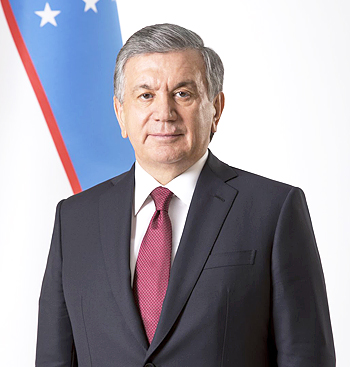
October 27 remains a significant day in the history of Uzbekistan and in Central Asia. In the heart of Central Asia, Uzbekistan commits itself towards a path to democracy, opening an electoral system which firm up the representation centred around the power of its people—its citizen.
President Shavkat Mirziyoyev's administration has emphasized the importance of fair elections. So, the elections were observed by more than 850 foreign and international observers—sending a message that it opens its doors towards transparency and accountability in an unprecedented global outreach.
President Shavkat Mirziyoyev's administration has emphasized fair elections, observed by over 850 foreign and international observers, signalling unprecedented transparency and accountability
The significance also lies in its close cooperation with India in its resolve to build a robust democracy based on economic stability and digitisation as Uzbekistan's First Deputy Foreign Minister Bakhromjon Aloyev outlines during the course of election in a special interaction with the author.
Taking massive countrywide exercise, elections were held to the Legislative Chamber of the Oliy Majlis (national parliament) of the Republic of Uzbekistan and local Kengashes (Councils) of people's deputies.
A democracy to nurture
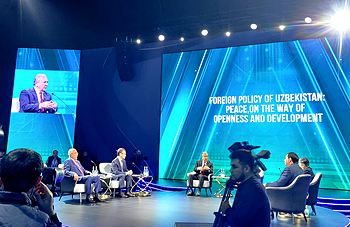
The idea that democracy is not monolithic and it does have its own progression is the core of true democratic reforms. That works well in its organic growth attached to the region in terms of its socio-economic structures and complexity. The recent election and opening the electoral systems in the secular tradition of Uzbekistan represent that very ambition which needs to be encouraged. With a level of transparency in its electoral exercise, Uzbekistan attempts to showcase its resolve to nurture its democracy.
In a step forward, President Mirziyoyev has presented an ambitious and economic reform programme. In his "Development strategy for a new Uzbekistan 2022-2026", he boldly outlines administrative reforms, greater representation and strengthening constitutional framework. In his address, President has called a free civil society, market-economy which is based on openness and competition, aiming to be part of global supply chain.
India, as the world's largest democracy, is committed to supporting Uzbekistan's democratic transition, focusing on democratic governance, human rights, and institutional strengthening
"This is definitely towards an open and competitive economy," echoes the Deputy Foreign Minister Aloyev as outlined by the President Mirziyoyev.
The current elections, for the first time in the history of the country, organized under a mixed electoral system, combining majoritarian and proportional systems, were successful. During the pre-election campaign, it was clearly seen that the introduction of a mixed electoral system increased competition between political parties and a democratic environment in society.
The elections were also directly observed by 55 thousand observers from political parties and more than 10 thousand observers from self-governing bodies of citizens.
India and Uzbekistan:
India, as the world's largest democracy, has shown tremendous interest in supporting Uzbekistan's democratic transition. This alignment in values presents an opportunity for India to engage with Uzbekistan on democratic governance, human rights, and civil society development. By offering technical assistance and sharing experiences in democratic practices, India aims to cooperate and strengthen Uzbekistan's institutional framework and promote a more inclusive political environment.
India and Uzbekistan share a historical connection that has evolved into a robust strategic partnership, particularly in the realms of security, economic cooperation, and cultural exchange. As Uzbekistan solidifies its position in Central Asia, India has recognized the importance of deepening ties with this key nation to bolster its influence and interests in the region.
The relationship between India and Uzbekistan can be traced back centuries, influenced by trade routes, cultural exchanges, and historical interactions. The legacy of the Silk Road created a foundation for commercial and cultural ties, while the shared heritage of the Persian Empire and Islamic culture further strengthened these connections. However, it was only after Uzbekistan gained independence in 1991 that formal diplomatic relations began, paving the way for a strategic partnership.
"We attach a great importance in strengthening the interconnectivity between Uzbekistan and India"- Dy. Foreign Minister Bakhromjon Aloyev
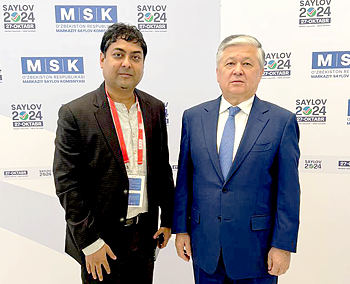
In an exclusive interaction, during his stay in Tashkent as an election observer, Manish Kumar Jha speaks With Uzbekistan's First Deputy Foreign Minister Bakhromjon Aloyev on strengthening cooperation in the region and its special relations with India.
Manish Jha (Jha): You said, this selection, is there is a progressive evaluation is a parting towards the democracy in, how significant is the selection? Could you define it for the audience in South Asia? Why It is such a milestone is selection for you in this country?
Bakhromjon Aloyev (Aloyev): This election is very important in terms of enhancing the Corporation and enhancing the cooperation with the South Eastern countries and strengthening the level of democracy. During your stay here in Tashkent and other places, you will witness the spirit of transparency and openness and in line with International democratic norms.
Look at here, we have the more than 100 representatives of major foreign media. This is an important process towards transparency. And here I would like to highlight regarding your question on the cooperation with India and last six-seven years we see India on the top level in the forum policy.
India is big countries with large enterprises. They are making big investment in Uzbekistan and thanks to their initiatives, out economic ties are very strong. We attach a great importance in strengthening the interconnectivity between Uzbekistan and South Asian countries. And in this regard, we have implemented a number of projects and which are being supported by our foreign partners. These projects were initiated by the President of Uzbekistan. And this political event has a big in terms of the developing, our relationships with South Asian countries.
Jha: You said Uzbekistan will not only play a crucial role in any peace process in Central Asia but beyond. Say, you have been mediating and talking with leaders from Afghanistan. What is the foreign policy Outlook forward now?
Aloyev: We give utmost priority to our region—Central Asian countries. Since 2017, we have resolved all problems and issues with our neighbour peacefully.
And thanks to the political strong political will and initiatives of the President of Uzbekistan President Shavkat Mirziyoyev, today we can see that the new atmosphere and the new picture in the Central Asian regions. And we at the developing political dialogue, we are enhancing our cooperation in the transport sector in the region and through people-to-people diplomacy.
And so, we can see that the today Central Asia is taking a united front in international arena. And thanks to President of Uzbekistan, we have formed a new format of consolidative dialogue among the head of Central Asian countries.
We have established this format a few years ago and it's gone a full circle. And now the second meeting will be hosted by the Uzbekistan. And regarding the trend in the economic operation, our relationship, our cooperation in investments in tourism, in people to people is developing very actively and positively and it will continue; so, in the future.
Economic Cooperation
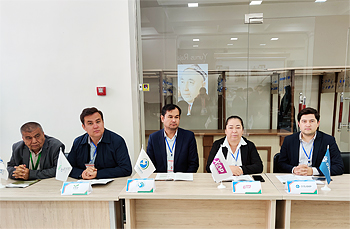
In recent years, economic ties between India and Uzbekistan have gained significant momentum. Trade has steadily increased, with India emerging as one of Uzbekistan's largest trading partners. In 2022, bilateral trade reached approximately $400 million, covering sectors such as pharmaceuticals, textiles, machinery, and agriculture. India has also invested in various sectors within Uzbekistan, including information technology, renewable energy, and agriculture, enhancing economic collaboration.
The establishment of the India-Uzbekistan Business Council has further facilitated economic dialogue, providing a platform for businesses from both countries to explore opportunities. Joint ventures, particularly in the pharmaceuticals and energy sectors, highlight the potential for increased economic integration. The ongoing focus on digital transformation and infrastructure development in Uzbekistan presents additional avenues for Indian companies to engage in lucrative partnerships.
Economic cooperation between India and Uzbekistan is growing, with bilateral trade reaching approximately $400 million in 2022, spanning pharmaceuticals, textiles, machinery, and agriculture
Security Cooperation
Security concerns in Central Asia, particularly relating to terrorism, drug trafficking, and regional instability, have prompted closer security cooperation between India and Uzbekistan. Both nations recognize the importance of a stable and secure environment for sustainable development. India's engagement in Uzbekistan's security framework is underscored by joint military exercises and training programs aimed at enhancing counter-terrorism capabilities.
India's interest in stability in Afghanistan also aligns with Uzbekistan's security concerns, as both countries seek to prevent the spillover of extremism and violence. The establishment of the India-Uzbekistan Joint Working Group on Security Cooperation marks a significant step in addressing these mutual security challenges, facilitating intelligence sharing and collaborative efforts in combating terrorism.
Central Asia's Geopolitical Landscape
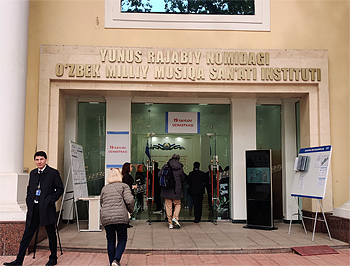
Central Asia, with its strategic location between Europe and Asia, is increasingly becoming a focal point in global geopolitics. The region's rich natural resources and economic potential make it an area of interest for various global powers, including Russia, China, and the United States. India's growing engagement in Central Asia is part of its broader strategy to enhance its influence in the region and secure economic opportunities.
India's "Connect Central Asia" policy underscores its commitment to fostering strong ties with Central Asian nations. By deepening relationships with Uzbekistan, India seeks to counterbalance the influence of China and Russia while also addressing its energy security concerns and enhancing regional connectivity through initiatives like the International North-South Transport Corridor.
Cultural Exchange and People-to-People Ties
Cultural ties between India and Uzbekistan have flourished, driven by shared historical narratives and contemporary initiatives. The promotion of cultural diplomacy through educational exchanges, tourism, and art has helped strengthen the bonds between the two nations. Scholarships for Uzbek students to study in India and Indian cultural programs in Uzbekistan are pivotal in fostering mutual understanding.
Moreover, the presence of a significant Uzbek diaspora in India and vice versa adds another layer of connectivity, facilitating exchanges in business, culture, and education. These people-to-people ties are essential for building long-term relationships and enhancing bilateral cooperation.
India and Uzbekistan are on a promising path toward a stronger partnership characterized by mutual interests in security, economic collaboration, and democratic development. As Uzbekistan continues to navigate its political reforms and establish itself in the global arena, India's engagement will be crucial in shaping the future of this partnership. With both nations committed to enhancing their ties, the next decade promises to be transformative for India-Uzbekistan relations in Central Asia, paving the way for a more secure, prosperous, and democratic region.
Manish Kumar Jha is a Consulting & Contributing Editor for SP's Aviation, SP's Land Forces and SP's Naval Forces and a security expert. He writes on national security, military technology, strategic affairs & policies.





